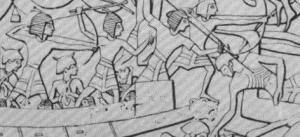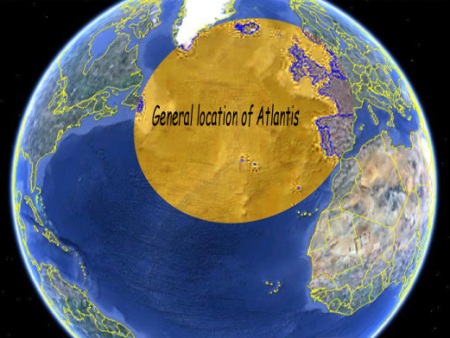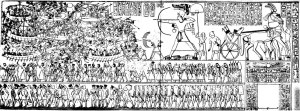© 2012 Mark Macy
Atlantis is more than a myth. Here’s what we can deduce so far about that First Epoch of modern humanity, after correlating contacts from spirit group Timestream with information from various worldly sources (listed at the end).
Backstory
Edenite colonists became stranded on Earth long ago when their home planet Eden, or Marduk, was destroyed by powerful technologies.
The Edenites were brilliant, formless spiritual beings involved in a project to spread order into the material realm of solid forms. They weren’t just passing through (as spirits tend to do in our universe), but were committed to the long-term project… and for that they needed physical bodies. Like modern astronauts donning space suits to subsist on the moon, the Edenites donned superhuman bodies as outer garments, or carnal vehicles, that let them reach out, touch and manage the material structures around them while living on planets like Eden and Earth.
After the destruction of Eden, Earth was the only planet left in our solar system that would support physical human life.
So the project became focused on Earth. It was quite a down-shift, considering that the Earth was so much smaller than the Saturn-size Eden… like a grape next to a watermelon. The goal of the stranded Edenites, then, was to nurture a terrestrial paradise that would eventually be inhabited by humans well suited, in terms of biology and disposition, to serve as stewards of Earth.
Edenite genetics—what Plato would later refer to as “divine and heroic lineage”—was diluted and shaped over many millions of years through genetic engineering and mixing with human stock, producing various human and superhuman hybrid species.
Despite occasional setbacks—impacts by Eden-rubble, ice ages, volcanic convulsions—paradise was sustained on Earth for quite a long time. Edenites and their various human hybrids actually lived at peace with each other and with animals. But things were a lot different then. For one thing, population must have remained fairly stable. Gender and sex apparently were not yet part of the human experience. The superhumans enjoyed lives more like spiritual beings, moving among dimensions, beyond time and space, frequently rejuvenating their physical bodies to youthful vigor, enjoying lifespans of many thousands—even millions—of years. A day passes for us today, perhaps, as 10,000 years passed for the Edenites. They were timeless spiritual beings simply enjoying illusory physical experiences in a paradise setting on Earth.
But all that ended with the last ice age (360-260 million years ago). The Edenites were experimenting with powerful technologies around that time, and a series of calamities caused severe geologic upheavals. Those upheavals contributed to the end of the ice age, and probably caused bizarre mutations throughout terrestrial ecosystems as well. From the mayhem, dinosaurs lumbered onto the scene some 230 million years ago, and paradise was lost. Earth got rowdy as a predator-prey scenario became a way of life here, and the various hybrids of humans and superhumans had no choice but to protect themselves and fight back. Eventually, their higher intellect won out and the dinosaurs were vanquished.
Once the dinosaurs were gone, some 60 million years ago, the Earth began to settle down, and the paradise project resumed, although now the goal was no longer to sustain paradise, but to restore it. It wouldn’t be easy, since killing to survive had become a way of life since the upheavals.
A new human being would have to join the project—some kind of noble-savage creature with an elevated IQ fueled by wisdom, love and good will that could someday restore paradise to a troubled world… and survival savvy triggered by fear and aggression that would ensure survival in a ruthless environment. The new human would be kind and empathetic one moment, lusty and aggressive the next… depending on the surprises going on around him and the hormones coursing through him.
Enter Atlantis and the Cro-Magnon
The hybridization of humanity came to a head some 36,000 years ago when the Cro-Magnon man appeared in Europe. The Cro-Magnon marked the dawn of Atlantis—the beginning of the First Epoch of modern humanity.
Atlantis was a large island colony—part of a flourishing civilization that was sprinkled across most of the Earth’s land mass. The reigning creatures on Earth were now descendants of the Edenites—giant superhumans that the Greeks would later call Titans. The Edenites themselves apparently had left the Earth, probably returning to the finer realms of spirit, monitoring the paradise project from there, and perhaps visiting Earth periodically by incarnating into a physical body for a lifetime… to get a “hands-on” experience of what was going on.
Titans from the province of Altima were designated as the overseers of Atlantis and its new race of Cro-Magnons. The Atlantis colony was housed on a group of islands in what today is the Atlantic Ocean. Again, the underlying purpose of the Titans was to guide and support the humans on the paradise project.
Atlantis wasn’t always a set of islands. Long ago, North America and Europe were connected by an expanse of land between them, to form one massive continent. Geologic convulsions from impacts and volcanic instability caused separation, first of North America, then of Europe, from the central land mass. It was that central land mass that then became the island continent of Atlantis, which was roughly the size of South America, stretching almost to the US in the west, Greece in the East, and Greenland to the north.
The Atlantis colonies started out as the epitome of human nobility, but careless curiosity and misguided science would lead to savagery and a series of geological disasters.
Early on the Atlanteans excelled in medicine, electronics, telekinesis, and teleportation (moving by thought). Organ transplants were routine, replacing normal or defective brains and hearts with far superior ones… and not just the physical organs. The spiritual essence, or soul, would accompany the living organ during the transplant, so that the recipient was enhanced spiritually as well as physically.
Troubles began when the savage side began to override the noble side. For one thing, the Titans apparently became preoccupied by sex. Eventually their medical genius was applied less to holistic human well-being, and more to refining the reproductive organs… their own as well as those of the Cro-Magnons. There developed an obsession with human emotions and sexual passion… which is apparently why ancient legends often center around powerful bad boys gone wild—gods battling gods, having sex with Cro-Magnon women, squabbling over territory….
They also developed a fascination for strange interspecies hybrids, transplanting a human head on the body of a lion or cow, for example.
The Atlanteans became curious about and careless with Earth’s elements. They probably conducted hydrogen fusion experiments, as well as channeling powerful spiritual energies into the material world, triggering chain reactions that caused a series of geologic upheavals. The first occurred some 16,000 years ago. The second one—some 10-12,,000 years ago—destroyed most of Atlantis, causing the bulk of the continent to sink hundreds of feet below sea level. As the mud and debris settled over the decades, the Atlantic Ocean came to be.
The new, down-sized Atlantis was then located in the North Atlantic, with its capital of Basileia near modern-day Helgoland… off the coasts of Germany and Denmark. The area was rich in amber, which was as valuable as gold at the time, contributing to the wealth of latter-day Atlantis.
By now, the “divine lineage” of humanity had been heavily diluted by crossbreeding with various noble-savage human species. Atlantis had become a war-like culture, and additional wealth came from looting civilizations along Europe’s west coast and throughout the Mediterranean region. Egyptian stone reliefs tell of invaders from the north wearing horned helmets and arriving in long boats with animal heads carved onto the bow. These were the Atlanteans.

Detail from the stone relief shows Atlanteans in horned helmets being killed and captured by the Egyptians.
More cataclysms in Atlantis between 2400 BC and 1220 BC destroyed what remained of the civilization, bringing the First Epoch of modern humanity to a close. Powerful aftershocks resumed for centuries. Major earthquakes rattled Europe in 465 BC, 426 BC, and 373 BC.
Some of the Titans who survived the fall of Atlantis emigrated to the Mediterranean area and became key figures in the emergence of great civilizations early in the Second Epoch. Ninus helped develop Babylon, while Thoth and Horus settled in Egypt.
The fascinating story of Thoth will be the subject of my next post.
Sources:
Plato’s Atlantis
Edgar Cayce’s Atlantis
The Only Planet of Choice
Thoth, The Atlantean
Viking Amber Traders and Ancient Egypt
Cave of Forgotten Dreams (film)
Other posts in the “Human Story” series:
Introduction: Pursuing Life’s Purpose Amid the Drama
1 – From the Source of All-That-Is
2 – Physical Life and Spiritual Life
3 – An Ancient Timeline
4 – The Edenites and Their Descendants
5 – The Seven Ethereals
6 – The Afterlife Eden
7 – The Afterlife of Jules Verne
8 – The Afterlife of Arthur Moos
9 – The Afterlife of Sir Richard F Burton
10 – The Afterlife of Anne de Guigné
11 – Afterlife Wrap-Up
13 – Thoth the Atlantean
14 – Modern Civilization Sprouted from Ancient Pyramids
15 – Hands that Caress and Strangle the World
16 – End of Story, End of Times



Mark, I don’t know if this fits but, I found this on YT. Looks like there could be evidence to suggest that the human race has almost been wiped out many times.
Thanks George,
looks like a step in the right direction
Mark